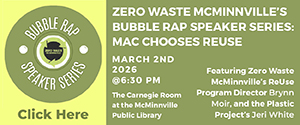Hughes: Bouncing back from a nasty bout with the coronavirus

Dick Hughes, retired editorial page editor of the Salem Statesman Journal, is a Linfield alum who got his start at the McMinnville News-Register. His Capital Chatter column appears on the Oregon Capital Insider website, a collaboration of the EO and Pamplin media groups. Used with permission.
A not-so-funny thing happened on my way to writing my Capital Chatter column three weeks ago. I became a statistic.
I went from sitting at my laptop to being whisked by ambulance to Salem Hospital with a serious case of COVID-19 pneumonia, despite being fully vaccinated. After a week of excellent hospital care, I’m now recovering at home.
Thank goodness our daughter insisted I buy a pulse oximeter after testing positive for COVID-19. I’d assumed mine would be a brief, mild case, in line with what was being reported about the so-called breakthrough transmissions. I felt no symptoms other than an annoying cough and extreme fatigue, not realizing the latter was due to shortness of breath.
A pulse oximeter measures oxygen levels in the blood. At least 90% is desirable.
The ambulance crew found mine had dropped dangerously low — so low that I had apparently fallen into a state of “happy hypoxia,” far sicker than my outward symptoms indicated.
There are two ways of interpreting my case. One is to infer that COVID-19 vaccinations are imperfect because I fell outside the commonly quoted statistical predictions. And that is true.
I prefer a second interpretation. As a nurse bluntly told me: “If you hadn’t been vaccinated, you’d probably be dead. Or upstairs in the ICU on a ventilator.”
These days, most of those patients are ones who are unvaccinated. Too many, depending on one’s individual circumstances, won’t make it out alive.
Medicine is imperfect, constantly changing and adjusting as we learn more. Just last week, a federal task force reversed its 2016 recommendation that certain individuals take a baby aspirin each day to prevent an initial heart attack or stroke.
Almost every medication or intervention carries risk. So does failure to act.
I chose to get vaccinated because the odds of serious complications or death from contracting COVID-19 are far higher than the risks from the Pfizer vaccine I took.
But I recognize those odds are only societal averages. Statistics don’t determine what will happen with any one of us.
Regardless of whatever decision one makes about being vaccinated, the decision will turn out badly for some individuals, leading to severe complications, even death. That is reality. None of us can know beforehand, so we must make our own calculations based on good but imperfect data.
Health officials have declared the vaccines safe. I wish they would more honestly describe vaccines as “relatively safe — safer than most drugs being promoted on TV for other conditions.” And no, the coronavirus vaccine does not cause COVID-19.
I was vaccinated in March by Oregon National Guard members and Salem firefighters at the Oregon State Fairgrounds. Research suggests the Pfizer vaccine’s effectiveness in preventing infection drops sharply after six months but remains 90% effective at preventing hospitalization and death. I guess I’m one of those outliers in the 10%, although slowly improving.
Nearly 2.4 million Oregonians have been vaccinated. Infections in vaccinated individuals continue to be uncommon.
Being both vaccinated and having had COVID-19, my odds of future infection are low. But I’m still going to get a vaccine booster. And return to wearing masks.
Throughout the pandemic, my wife and I faithfully followed the public health protocols, not becoming hermits — she went to work every day — but being careful. We adapted to wearing masks everywhere, including at restaurants when not actually eating or drinking.
We took a road trip to Klamath and Lake counties in May. Trying to fit in, we abided by the local practices, which varied by establishment. But as infections intensified this summer, I skipped my 50-year high school reunion.
Perhaps I became overconfident about my and others’ vaccinations, assuming any infection would be minor. Meanwhile, the Salem area remains a statewide leader in new infections, thanks to the overwhelming presence of the Delta variant.
There is no way to tell how I got infected, or with which strain. It might have been my forgoing masks when gathering with vaccinated friends.
Yes, masks are only partially effective, but they provide one more barrier against transmission. It’s all about moving the odds in one’s favor.
A friend tested positive Sept. 21 after having what he thought was a mild cold. He informed us immediately. The coronavirus has so overwhelmed county health departments that it’s pretty much up to individuals in the Salem area to do their own contact tracing.
Feeling puny, I arranged to get a COVID-19 test the next day, although the doctor considered a coronavirus infection unlikely.
My wife also tested positive, with a mild but fatiguing case. I was constantly coughing and needing a 10-minute rest before making even the short walk from bathroom to bed.
As I sat down at my laptop to write that Thursday morning, I also contacted Kaiser Permanente for advice, providing my latest oxygen levels. The response: Call 911 immediately. Get taken to whichever hospital has room for you.
The Salem firefighters and Falck ambulance crews were skilled, efficient and gracious. Having covered health care for decades and being comfortable around hospitals, I felt at ease. Besides, for a journalist every experience becomes fodder for a column.
Salem Hospital runs the busiest emergency department on the West Coast, made busier by the pandemic.
Signs designate spaces for temporary hall beds. I was parallel parked until a room became available, which happened soon.
I have great appreciation for the National Guard members helping out there. Every movement they performed saved time for a nurse, certified nursing assistant, transporter or other staff member.
Overall, the care was excellent.
The two columns I missed were the first since I began writing Capital Chatter in December 2016. That bugged me more than being in the hospital itself.
Years ago, Miami Herald columnist Leonard Pitts Jr. told students in a class I was teaching at Willamette University that a columnist’s responsibility is to give readers the best he has to offer that day. Some days, that’s more than others, he said.
This column is what I have to offer today. Thank you for reading. You are why I report and write.












Comments